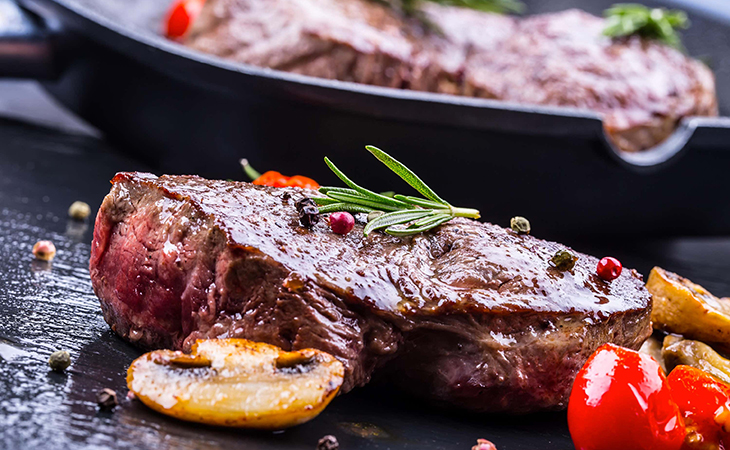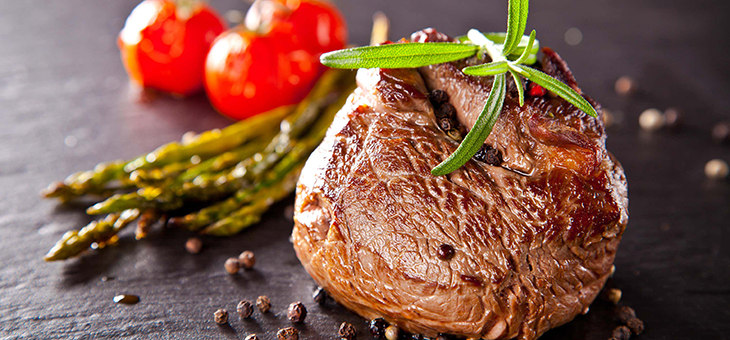Red meat has long played a leading role in diets across the Western world, but a growing body of evidence associates eating too much of it with increasing health risks. Now, a large-scale study has linked red and processed meat directly to an increased risk of heart disease. Here’s how to reduce the amount you eat, one cold cut at a time.
Vegan replacement food
Vegan meat has plotted a similar path to alcohol-free beer, and has finally broken into the mainstream, thanks to changing habits and a marked uptick in quality. It took both substitutes a while to find their feet, and there was a time relatively recently when neither were given much truck by the world’s carnivores and beer-lovers.
Read: Liven up vegetarian dinners with these meat replacements
But over the past couple of years, brands in both camps have finally nailed authentic taste, and now both industries are booming. Beyond Meat burgers frequent restaurant menus, Gosh meat-free sausages are common in supermarket aisles, and Tofurky-stuffed sandwiches populate plenty of picnics.
They honestly do taste very similar. They didn’t used to, but they do now.
Use traditional vegie options
Vegie burgers existed long before the recent vegan explosion, and meatless meals have long relied on similar foodstuffs like soya and mycoprotein. Quorn has been flooding the midweek market since the 1980s (we’re fairly sure not everyone knows it’s a brand, not a food), with protein products that don’t really mimic meat, but fill in for it well anyway.
Eat more chicken
Almost anything red meat can do, chicken can do better, or at least nearly as well. Chicken burgers fill out a bun just as well as beef, and chicken breasts look just as good smoked or grilled as other cuts of meat.
Eat fewer (or different) takeaways
Compared to how much it features in home cooking, red meat is massively overrepresented in the takeaway market. Burger joints dot every high street, steak is standard at the slightly higher end, and sausage and chips make up the bulk of most pub menus.
Read: Are meat substitutes good for us?
It is highly likely that if you started cooking at home more, the amount of red meat in your diet would drop almost by accident. Your bank account would thank you too. Win-win.

Have a red meat-free barbecue
Barbecues are an Australian staple, and red meat is a staple of most barbecues, in part because of how it sizzles and changes colour on the grill. Chicken thighs, turkey escalopes, stuffed peppers, halloumi slices, sweet potato skewers, charred aubergines, corn on the cob … ignore the propaganda, you can easily barbecue without beef.
Anything is better than nothing
Moderation seems somewhat out of fashion these days. You don’t have to sell your house and live on an allotment to help fight climate change, and you don’t need to banish red meat from your kitchen altogether to help your health.

Even just a little bit less is a good start, and there’s certainly nothing wrong with treating yourself. Slashing your bi-monthly trip to your favourite steak restaurant is low priority compared to what you eat in-between.
Pick one thing to drop first
Pork sausages, beef burgers, lamb chops. Bin your least favourite, and you’re a third of the way there already. Or you could erase one type of meat, such as heavily processed products that might also be bad for you in other ways.
Read: The benefits of meat-free days
Have you reduced your consumption of meat? Have you tried any meat alternatives? Why not share your favourite vegie dish in the comments section below?
– With PA
If you enjoy our content, don’t keep it to yourself. Share our free eNews with your friends and encourage them to sign up.

